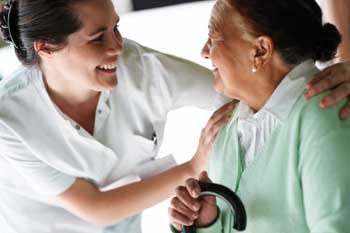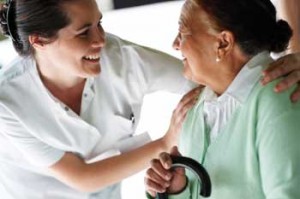Nursing Holistically

Nursing Holistically
A blend of modern and alternative health practices provide enhanced care.
by Susan Weiner, Energy Times
It isn’t often that you come across a hospital where CEO stands for “Customer Expectation Officer,” the director of patient care refers to herself as “Executive Healer,” and essential oils, guided imagery, healing touch and acupuncture are everyday treatments. “These modalities are within the course of patient care. Our whole hospital is built on these holistic fundamentals,” says Cindy Bultena, RN, MS, patient care executive at Woodwinds Hospital, an acute care facility in Woodbury, Minnesota (www.healtheast.org/woodwinds).
 Woodwinds, like a number of newer hospitals, tries to avoid an austere institutional environment through the carefully coordinated use of color, lighting, artwork and music. But what really sets it apart from traditional healthcare facilities is an integrative healing philosophy and a staff of holistic nurses, a form of nursing recognized as its own specialty.
Woodwinds, like a number of newer hospitals, tries to avoid an austere institutional environment through the carefully coordinated use of color, lighting, artwork and music. But what really sets it apart from traditional healthcare facilities is an integrative healing philosophy and a staff of holistic nurses, a form of nursing recognized as its own specialty.
Holistic nursing embraces the whole patient and frequently includes the use of complementary and alternative medicine (CAM). Holistic practice also stresses the importance of self-care for the practitioners themselves, believing that fewer nurses would burn out—a common occurrence—if self-care took precedence. “One must have a healing relationship with oneself to serve others,” explains Bultena, who helped design Woodwinds. “You can’t give and give to others unless you pay attention to yourself, and that is really the key to holism. You have to care for the caregivers.” As a result, holistic nurses are likely to seek out alternative treatments themselves.
Putting Patients First
Betty Strafaccia of Woodbury has twice experienced holistic nursing firsthand. The 68-year-old retiree became one of Woodwinds’ 400 volunteers after her husband, David, spent his final days there in 2006 with ALS (also known as Lou Gehrig’s disease). The night he died surrounded by family, “nurses brought up a cart with coffee and refreshments,” Strafaccia says. “It was so unusual.”
She contrasts that experience with her mother’s visit that same year to a traditional hospital in St. Paul. “I was not happy right from the emergency room on,” Strafaccia recalls. “There were four patients per room, the hallways were cluttered, the treatment was not the same.”
In February, Strafaccia became a patient at Woodwinds when she needed to have her gallbladder removed. “I took advantage of everything I know they have: I had acupuncture for a headache, a wristband for stress, lavender essential oils for nausea and I listened to healing music,” she says.
“It’s patient-oriented and the employees are clearly happy. And they really work to keep the patients happy.”
It isn’t just places like Woodwinds where holistic nurses—and the philosophy that motivates them—have found a home. The American Holistic Nurse’s Certification Corporation endorses holistic nursing education programs at 13 schools, and 36 US teaching hospitals are pushing to blend CAM with traditional care. Facilities such as Cedars-Sinai Medical Center in Los Angeles, the Mayo Clinic in Minnesota, Duke University Heath Systems in North Carolina, Children’s Memorial in Chicago and New York-Presbyterian/Columbia routinely offer alternative therapies such as massage therapy, yoga, hypnosis, reflexology and guided imagery alongside Western medicine.
Hand-in-Hand
Jeanne Crawford, executive director of the American Holistic Nurses Association (www.ahna.org, 800-278-2462), doesn’t consider the use of alternative medicine contrary to standard allopathic medicine. “The traditional nurse is a holistic nurse,” explains Crawford. “It’s only in the last 40 years that nursing has moved away from traditional nursing and become more technological. The public is really crying out for more caring practice.”
Frustrated by the pressures of tending to multiple patients in hectic settings, many nurses welcome a return to holistic care—a concept attributed to Florence Nightingale, who fought to give both patients and nurses a voice. “Nurses are really looking to serve the entire patient,” notes Crawford. “They don’t want to just run into the room, give pills and run out.”
Still, Crawford admits that holistic nursing in today’s hurried medical setting is a challenge. “Nurses are overworked, underpaid and undervalued,” she says. Certified holistic nurses face challenges emanating from the current system, including a sense of disjuncture between conventional and alternative approaches to medicine and a need for successful ways to help them make the transition into holistic nursing (Journal of Holistic Nursing 6/06).
In the last five years, AHNA membership has increased from 1,600 to 4,500. Certification in holistic nursing is obtained through the American Holistic Nurses’ Certification Corporation (AHNCC, www.ahncc.org), a national credentialing organization. In addition to a bachelors or masters degree, nurses must work 2,000 hours in holistic nursing practice, among other criteria, to become accredited as a holistic nurse.
Trained to serve as a bridge between conventional healing and alternative healing practices, holistic nurses are qualified in both complementary and Western healthcare models; some may specialize in one modality or more, including chiropractic care, acupuncture, music therapy, massage and clinical aromatherapy. Additional holistic specialties endorsed by AHNA include integrative reflexology, craniosacral therapy, healing touch and integrative healing arts.
Discovering the causes of sickness can be trying on patients and loved ones. A holistic nurse is trained to help the patient connect the dots between illness and its environmental, social, emotional and mental triggers. When battling ill health, a holistic nurse may help patients overcome challenges sooner and prevent regression, the result of what AHNCC calls “an advanced set of nursing skills.”
Holistic nurses can be found in hospitals, universities and private practices across the US, according to AHNA. “If a person is looking for a holistic nurse, call us for referrals,” says Bultena. “We have network leaders in every state.”
Holistic nursing trusts that one-on-one connections, in conjunction with a complementary blend of both Western and Eastern medicine, is the best way for nurses to connect with their patients. For many, that may be just the type of treatment that the doctor—or nurse—ordered.